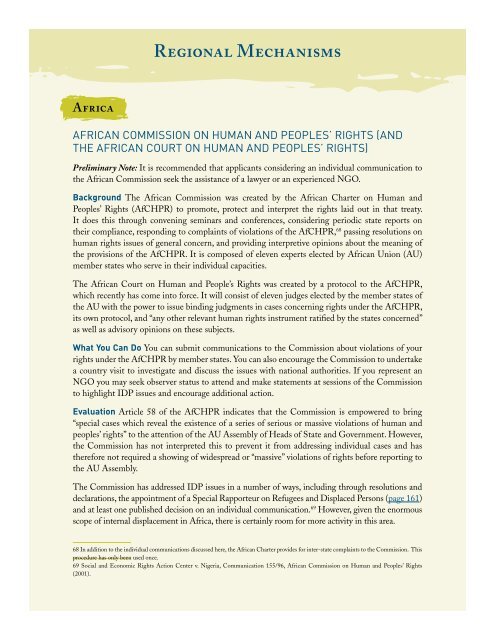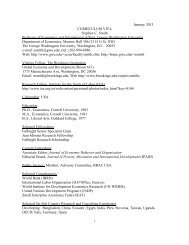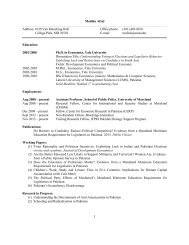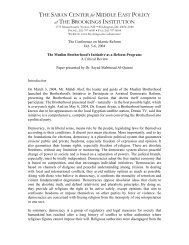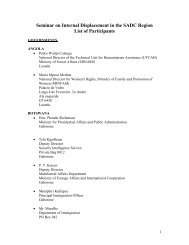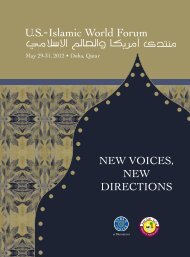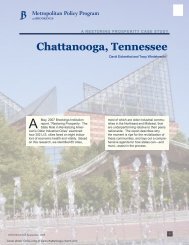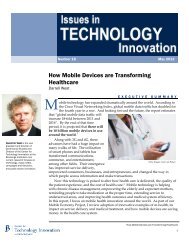Guide to International Human Rights Mechanisms - Brookings
Guide to International Human Rights Mechanisms - Brookings
Guide to International Human Rights Mechanisms - Brookings
Create successful ePaper yourself
Turn your PDF publications into a flip-book with our unique Google optimized e-Paper software.
Africa<br />
Regional <strong>Mechanisms</strong><br />
AFRICAN.COMMISSION.ON.HUMAN.AND.PEOPLES’.RIGHTS.(AND.<br />
THE.AFRICAN.COURT.ON.HUMAN.AND.PEOPLES’.RIGHTS)<br />
Preliminary Note: It is recommended that applicants considering an individual communication <strong>to</strong><br />
the African Commission seek the assistance of a lawyer or an experienced NGO.<br />
Background The African Commission was created by the African Charter on <strong>Human</strong> and<br />
Peoples’ <strong>Rights</strong> (AfCHPR) <strong>to</strong> promote, protect and interpret the rights laid out in that treaty.<br />
It does this through convening seminars and conferences, considering periodic state reports on<br />
their compliance, responding <strong>to</strong> complaints of violations of the AfCHPR, 68 passing resolutions on<br />
human rights issues of general concern, and providing interpretive opinions about the meaning of<br />
the provisions of the AfCHPR. It is composed of eleven experts elected by African Union (AU)<br />
member states who serve in their individual capacities.<br />
The African Court on <strong>Human</strong> and People’s <strong>Rights</strong> was created by a pro<strong>to</strong>col <strong>to</strong> the AfCHPR,<br />
which recently has come in<strong>to</strong> force. It will consist of eleven judges elected by the member states of<br />
the AU with the power <strong>to</strong> issue binding judgments in cases concerning rights under the AfCHPR,<br />
its own pro<strong>to</strong>col, and “any other relevant human rights instrument ratified by the states concerned”<br />
as well as advisory opinions on these subjects.<br />
What you can Do You can submit communications <strong>to</strong> the Commission about violations of your<br />
rights under the AfCHPR by member states. You can also encourage the Commission <strong>to</strong> undertake<br />
a country visit <strong>to</strong> investigate and discuss the issues with national authorities. If you represent an<br />
NGO you may seek observer status <strong>to</strong> attend and make statements at sessions of the Commission<br />
<strong>to</strong> highlight IDP issues and encourage additional action.<br />
evaluation Article 58 of the AfCHPR indicates that the Commission is empowered <strong>to</strong> bring<br />
“special cases which reveal the existence of a series of serious or massive violations of human and<br />
peoples’ rights” <strong>to</strong> the attention of the AU Assembly of Heads of State and Government. However,<br />
the Commission has not interpreted this <strong>to</strong> prevent it from addressing individual cases and has<br />
therefore not required a showing of widespread or “massive” violations of rights before reporting <strong>to</strong><br />
the AU Assembly.<br />
The Commission has addressed IDP issues in a number of ways, including through resolutions and<br />
declarations, the appointment of a Special Rapporteur on Refugees and Displaced Persons (page 161)<br />
and at least one published decision on an individual communication. 69 However, given the enormous<br />
scope of internal displacement in Africa, there is certainly room for more activity in this area.<br />
68 In addition <strong>to</strong> the individual communications discussed here, the African Charter provides for inter-state complaints <strong>to</strong> the Commission. This<br />
procedure has only been used once.<br />
69 Social and Economic <strong>Rights</strong> Action Center v. Nigeria, Communication 155/96, African Commission on <strong>Human</strong> and Peoples’ <strong>Rights</strong><br />
(2001).


